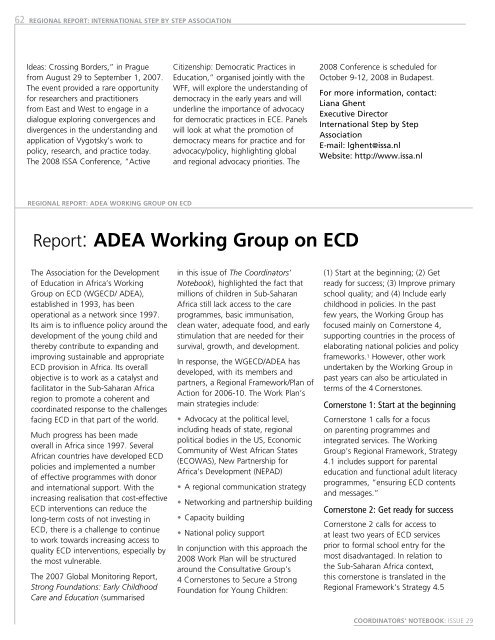A global call to action for early childhood
A global call to action for early childhood
A global call to action for early childhood
You also want an ePaper? Increase the reach of your titles
YUMPU automatically turns print PDFs into web optimized ePapers that Google loves.
62 REGIONAL REPORT: International Step by Step Association<br />
Ideas: Crossing Borders,” in Prague<br />
from August 29 <strong>to</strong> September 1, 2007.<br />
The event provided a rare opportunity<br />
<strong>for</strong> researchers and practitioners<br />
from East and West <strong>to</strong> engage in a<br />
dialogue exploring convergences and<br />
divergences in the understanding and<br />
application of Vygotsky’s work <strong>to</strong><br />
policy, research, and practice <strong>to</strong>day.<br />
The 2008 ISSA Conference, “Active<br />
Citizenship: Democratic Practices in<br />
Education,” organised jointly with the<br />
WFF, will explore the understanding of<br />
democracy in the <strong>early</strong> years and will<br />
underline the importance of advocacy<br />
<strong>for</strong> democratic practices in ECE. Panels<br />
will look at what the promotion of<br />
democracy means <strong>for</strong> practice and <strong>for</strong><br />
advocacy/policy, highlighting <strong>global</strong><br />
and regional advocacy priorities. The<br />
2008 Conference is scheduled <strong>for</strong><br />
Oc<strong>to</strong>ber 9-12, 2008 in Budapest.<br />
For more in<strong>for</strong>mation, contact:<br />
Liana Ghent<br />
Executive Direc<strong>to</strong>r<br />
International Step by Step<br />
Association<br />
E-mail: lghent@issa.nl<br />
Website: http://www.issa.nl<br />
REGIONAL REPORT: ADEA Working Group on ECD<br />
Report: ADEA Working Group on ECD<br />
The Association <strong>for</strong> the Development<br />
of Education in Africa’s Working<br />
Group on ECD (WGECD/ ADEA),<br />
established in 1993, has been<br />
operational as a network since 1997.<br />
Its aim is <strong>to</strong> influence policy around the<br />
development of the young child and<br />
thereby contribute <strong>to</strong> expanding and<br />
improving sustainable and appropriate<br />
ECD provision in Africa. Its overall<br />
objective is <strong>to</strong> work as a catalyst and<br />
facilita<strong>to</strong>r in the Sub-Saharan Africa<br />
region <strong>to</strong> promote a coherent and<br />
coordinated response <strong>to</strong> the challenges<br />
facing ECD in that part of the world.<br />
Much progress has been made<br />
overall in Africa since 1997. Several<br />
African countries have developed ECD<br />
policies and implemented a number<br />
of effective programmes with donor<br />
and international support. With the<br />
increasing realisation that cost-effective<br />
ECD interventions can reduce the<br />
long-term costs of not investing in<br />
ECD, there is a challenge <strong>to</strong> continue<br />
<strong>to</strong> work <strong>to</strong>wards increasing access <strong>to</strong><br />
quality ECD interventions, especially by<br />
the most vulnerable.<br />
The 2007 Global Moni<strong>to</strong>ring Report,<br />
Strong Foundations: Early Childhood<br />
Care and Education (summarised<br />
in this issue of The Coordina<strong>to</strong>rs’<br />
Notebook), highlighted the fact that<br />
millions of children in Sub-Saharan<br />
Africa still lack access <strong>to</strong> the care<br />
programmes, basic immunisation,<br />
clean water, adequate food, and <strong>early</strong><br />
stimulation that are needed <strong>for</strong> their<br />
survival, growth, and development.<br />
In response, the WGECD/ADEA has<br />
developed, with its members and<br />
partners, a Regional Framework/Plan of<br />
Action <strong>for</strong> 2006-10. The Work Plan’s<br />
main strategies include:<br />
• Advocacy at the political level,<br />
including heads of state, regional<br />
political bodies in the US, Economic<br />
Community of West African States<br />
(ECOWAS), New Partnership <strong>for</strong><br />
Africa’s Development (NEPAD)<br />
• A regional communication strategy<br />
• Networking and partnership building<br />
• Capacity building<br />
• National policy support<br />
In conjunction with this approach the<br />
2008 Work Plan will be structured<br />
around the Consultative Group’s<br />
4 Corners<strong>to</strong>nes <strong>to</strong> Secure a Strong<br />
Foundation <strong>for</strong> Young Children:<br />
(1) Start at the beginning; (2) Get<br />
ready <strong>for</strong> success; (3) Improve primary<br />
school quality; and (4) Include <strong>early</strong><br />
<strong>childhood</strong> in policies. In the past<br />
few years, the Working Group has<br />
focused mainly on Corners<strong>to</strong>ne 4,<br />
supporting countries in the process of<br />
elaborating national policies and policy<br />
frameworks. 1 However, other work<br />
undertaken by the Working Group in<br />
past years can also be articulated in<br />
terms of the 4 Corners<strong>to</strong>nes.<br />
Corners<strong>to</strong>ne 1: Start at the beginning<br />
Corners<strong>to</strong>ne 1 <strong>call</strong>s <strong>for</strong> a focus<br />
on parenting programmes and<br />
integrated services. The Working<br />
Group’s Regional Framework, Strategy<br />
4.1 includes support <strong>for</strong> parental<br />
education and functional adult literacy<br />
programmes, “ensuring ECD contents<br />
and messages.”<br />
Corners<strong>to</strong>ne 2: Get ready <strong>for</strong> success<br />
Corners<strong>to</strong>ne 2 <strong>call</strong>s <strong>for</strong> access <strong>to</strong><br />
at least two years of ECD services<br />
prior <strong>to</strong> <strong>for</strong>mal school entry <strong>for</strong> the<br />
most disadvantaged. In relation <strong>to</strong><br />
the Sub-Saharan Africa context,<br />
this corners<strong>to</strong>ne is translated in the<br />
Regional Framework’s Strategy 4.5<br />
COORDINATORS’ NOTEBOOK: ISSUE 29
















